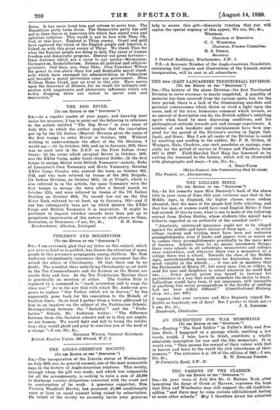THE LOLLARD BIBLE.
[To THE EDITOR OF THE " SPECTATOR.") SIR,—In his remarks upon Miss Deanesly's book of the above title in your issue of June 12th your reviewer says that in the Middle Ages, in England, the higher classes were seldom educated, that the mass of the people had little schooling, and that few men or women could have read English Bibles if they had existed. If this be true, what is one to make of the following extract from Bishop Stubbs, whom students like myself have hitherto regarded as an authority of the soundest sort?—
" Absolutely unlettered ignorance ought not to be alleged against the middle and lower classes of these ages . . . in every village reading and writing must have been not unknown accomplishments, even if books and papers were so scarce as to confine their accomplishments practically to the mere uses of business. Schools were by no means uncommon things; there were schools in all cathedrals; monasteries and colleges were everywhere, and wherever there was a monastery or a college there was a school. Towards the close of the Middle Ages, notwithstanding many causes for depression, there was much vitality in the schools . . . it was not in mockery that the Parliament of Henry IV. left every man, free or villein, to send his sons and daughter's to school wherever he could find one. . . . Every parish priest was bound to instruct his parishioners in a way that would stimulate the desire to learn. Lollardism would have been, if not innocuous, still incapable of anything like secret propagandism if the faculty of reading had not been widely diffused." (Constitutional History, chap. xxi., nar. 819.)
I suppose that your reviewer and Miss Deanesly regard Dr. Stubbs as hopelessly out of date? But I prefer to think not.--.


































 Previous page
Previous page